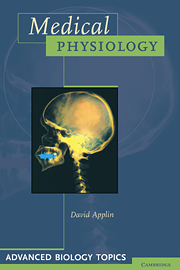Book contents
- Frontmatter
- Contents
- 1 What is disease?
- 2 Understanding the immune system
- 3 The control of bleeding
- 4 Heart disease
- 5 Physiological effects of exercise
- 6 Food and health
- 7 Diseases of the gaseous exchange system
- 8 Kidney failure
- 9 Fertility and contraception
- 10 The brain: memory, ageing and the effects of drugs
- 11 Medical genetics
- 12 Biotechnology and medicine
- Index
- Frontmatter
- Contents
- 1 What is disease?
- 2 Understanding the immune system
- 3 The control of bleeding
- 4 Heart disease
- 5 Physiological effects of exercise
- 6 Food and health
- 7 Diseases of the gaseous exchange system
- 8 Kidney failure
- 9 Fertility and contraception
- 10 The brain: memory, ageing and the effects of drugs
- 11 Medical genetics
- 12 Biotechnology and medicine
- Index
Summary
A decline in the function of the kidneys is a warning that something is wrong. Fall in urine output, increasingly acidic urine and retention of potassium ions (K+) in the urine are symptoms which alert the doctor to the possibility of developing kidney failure. Warning signs include:
impaired concentration, drowsiness and convulsions;
heart failure;
nausea and vomiting;
swollen feet.
A doctor's first task is to distinguish between acute kidney failure and chronic kidney failure. The symptoms of acute disease are abrupt, short term and, once diagnosed, may be reversible. The symptoms of chronic disease are long term, often irreversible and may require more drastic treatment. In both cases some of the symptoms are the same, making assessment of the condition difficult. However, precise diagnosis is important so that the correct treatment of the patient can begin.
Acute kidney failure
The causes of acute renal failure fall into three broad categories:
the blood supply to the kidneys can decrease because of heavy bleeding, infection or loss of fluids as a result of burns or severe diarrhoea;
thrombosis (page 39), bacterial infection or various drugs can cause structural changes in the nephrons and accumulation of fluid in the kidneys;
blockage of the collecting ducts or obstruction of the ureter or urethra can be a result of cancer, ‘stones’ (ureter only) or swelling of the prostate gland (urethra only).
- Type
- Chapter
- Information
- Medical Physiology , pp. 80 - 83Publisher: Cambridge University PressPrint publication year: 1997



